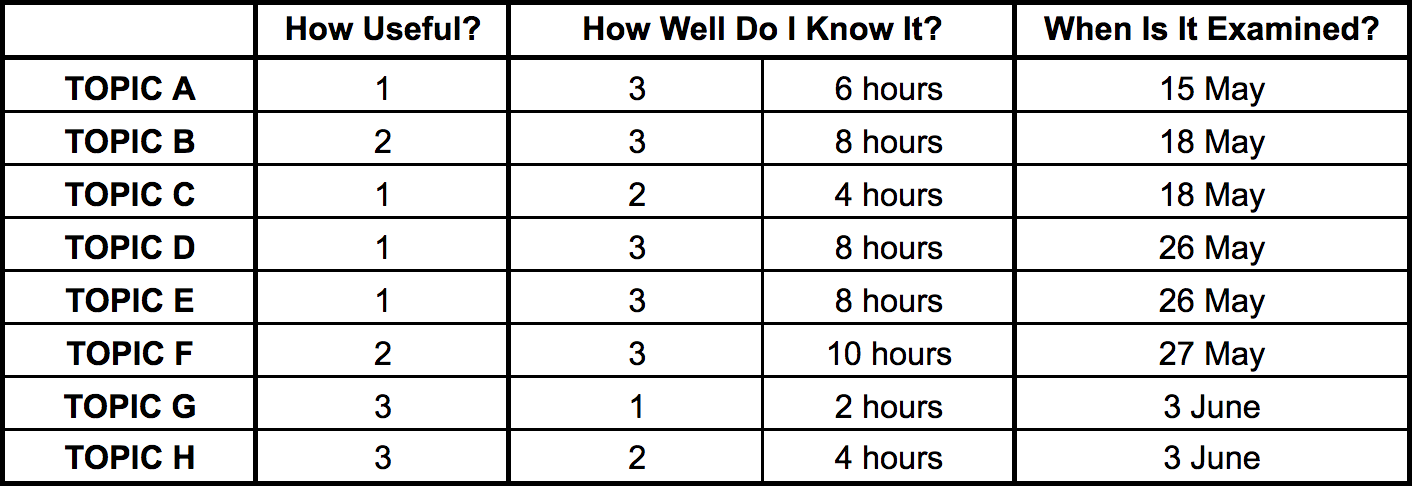So you’ve decided what you’re going to study. Now you need to decide how much of each subject, topic or sub-topic to study, and in which order you do so. This is where prioritisation comes in. Many students will prioritise tasks in a fairly naive way, such as deciding to work equally on everything. You can do much better than that.
Successful prioritisation should maximise the value of the work you perform. This means that you should always be working on whatever will improve your exam score by the greatest amount.
Before you prioritise, you need to have an awareness of where you stand with each unit of study. You should split your total exam workload into sensible groups. The most sensible way to split is usually by topic, but this won't always be the case. You can then use the following three questions to help you prioritise your groups:
Balancing the answers to these questions is not an exact science. You will have to use your own judgement in making decisions. This is also a continuous process because the answers to the second two questions will change over time.
The best way to keep track of and compare your status with each group is to create a table. Each row in the table represents one of your groups. Add a column for each of the three questions. For the first column, give each group a score from 1 to 3, with 1 meaning most useful and 3 meaning least useful. For the second column, do the same. But this time, 1 means I know this material very well. 3 means I don't know this material very well.
Also add a number in the second column to indicate the number of hours of remaining work you think you need to do to get yourself to an exam-ready state. The first two columns are just estimates to give you a rough idea of where you stand. You should update these at the end of each day.
Put your exam date for each group in the final column. Now you have a tool to help you prioritise your work.

Useful material is material which will contribute the most to your exam score. We’ve already discussed useful material in the form of versatile units, but the same idea applies to whole topics. If a question on Topic A is worth 50% of your total exam score, and a question on Topic B is worth 25% of your total exam score, then Topic A is twice as useful as Topic B. Topic A should be prioritised.
As humans, we much prefer to work on the things we’re already good at. It’s easier and it feels better. You must fight this inclination and concentrate on improving your weak spots.
The better you know a particular topic, the less potential there is to further improve on your exam score. Suppose that you routinely score 90% on Topic A. No matter how hard you continue to work on Topic A, you could only ever squeeze an extra 10% out of that work. Now consider Topic B, where you usually score only 50%. You can still get another 50% from it, which is 5x more than Topic A. Clearly you can improve your exam score much more by working on Topic B.

As well as the potential for improvement, your weaker topics offer a much better work-reward ratio.
Why?
Because the first 10% is always easier to score than the last 10%. The same goes for the first 20%, 30%, 40% etc. Exams are designed this way on purpose because it compresses the range of marks across all students.
Examiners will readily give you the first few marks but they will save the final few marks for only the very best answers. Get the easy marks first because they are worth just as much as the harder marks.

The closer the exam, the more priority it should receive. This does not mean that you should work exclusively on the most immediate exam. That could leave you seriously unprepared for subsequent exams. You need to strike a balance where you focus on the exams which are closer but also make time for other groups.
You must also consider when your exams take place relative to each other. For example, your prioritisation will differ significantly if your exams are on consecutive days rather than if they are weeks apart.
In any case, you will need some time shortly before each exam to remind yourself of all the material you have learned up to this point. You should reserve some time in your plan to do an overview of each group shortly before it is examined. This will refresh any knowledge that may have faded in your memory.
josh@examinationgame.com